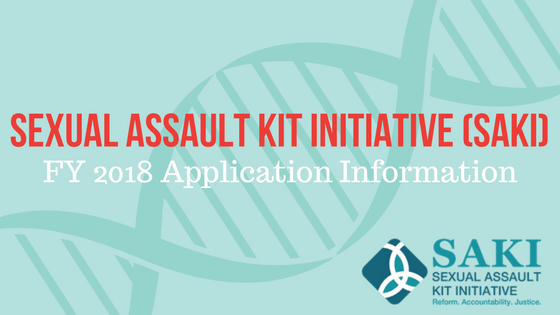The goal of this grant program is to address the growing number of unsubmitted SAKs in law enforcement custody, and to help provide resolution for victims when possible. There is broad consensus that this must be accomplished through a comprehensive approach to the problem. Grant funding may be used to inventory the existing numbers of unsubmitted SAKs, test these kits, and assign designated personnel to pursue new investigative leads and prosecutions and to support victims throughout the investigation and prosecution process. Grants may also be used to develop evidence-tracking systems, train law enforcement on sexual assault investigations, conduct research on outcomes in sexual assault cases, and increase collection of offender DNA for CODIS upload purposes (in full adherence to the laws in the jurisdiction), that may lead to the identification of serious and serial sex offenders.
Article originally published on www.bja.gov. Reprinted with permission.
In addition, the SAKI National Training and Technical Assistance (TTA) Program provides direct assistance to jurisdictions that receive funding through SAKI as well as other jurisdictions engaged in reform efforts. The selected TTA provider is charged with assisting jurisdictions in establishing sustainable change in practices, protocols, and policies as they relate to untested SAKs and sexual assault response. While each jurisdiction encounters unique challenges and circumstances, common issues are identified across all site grantees. BJA collaborated with the TTA provider to produce an online toolkit/resource guide to provide guidance and a centralized source of evidence-based practices and relevant TTA resources that can be leveraged by all jurisdictions grappling with the challenge of untested SAKs.
Since its launch in 2015, the Sexual Assault Kit Initiative (SAKI) has been making a difference by improving the response to sexual assault by identifying and apprehending violent offenders and by addressing the problem of unsubmitted sexual assault kits. To date, more than 45,000 sexual assault kits have been inventoried by 32 SAKI jurisdictions that represent 26 states. Over 12,000 kits have been sent for testing and nearly 1,000 DNA hits to the national CODIS database have already been made. The impact of SAKI is being felt at the community level both in terms of getting dangerous offenders off the street and empowering victims to come forward. In Wayne County (MI), more than 60 sexual assault offenders have been convicted. In Cuyahoga County (OH), the Sexual Assault Task Force helped link a serial rapist to 7 cases. In Las Vegas, the Metro Police have received 43 CODIS hits and arrested 8 offenders. In sites such as Fayetteville (NC), victims are more confident to come forward and report to law enforcement because of the victim-centered outreach from the police department and their community partners. States are also experiencing important changes. For example, for the first time in history the Attorney General of Montana has formed a task force to conduct a census of unsubmitted kits and has identified approximately 1,400 kits across the state which will be sent for testing.
Moving forward, the goal for SAKI is to not only reduce the number of unsubmitted sexual assault kits but also to eliminate the accumulation of unsubmitted kits from reoccurring. By promoting training, evidence tracking, and best practices, SAKI is helping jurisdictions establish effective and sustainable practices for collecting and processing forensic evidence, investigating and prosecuting sexual assault cases, and supporting survivors of sexual assault.
If you are interested in applying for a 2018 grant, more information can be found in the SAKI FY 2018 Competitive Grant Announcement. Please note that applications are due by April 30, 2018.
Please note the following when applying:
- FY 2015, FY 2016, and FY 2017 SAKI grantees are eligible to apply for additional funding through the FY 2018 solicitation.
- Collection of lawfully-owed DNA from convicted offenders to help with SAKI investigations and prosecutions remains in the FY 2018 solicitation under Purpose Area 3.
- Purpose Area 4 is new for 2018, and is specifically for the investigation and prosecution of cold case sexual assaults. To receive this funding, applicants must clearly demonstrate their jurisdiction(s) has previously addressed, or is currently effectively addressing, the major issues associated with unsubmitted SAKs.
- Effective FY 2018, successful applicants must also enter all “criteria cases” into ViCAP (before the end of the grant period) to increase the chances of identifying and apprehending violent serial offenders who pose a serious threat to public safety.
Would you like to see more articles like this? Subscribe to the ISHI blog below!


